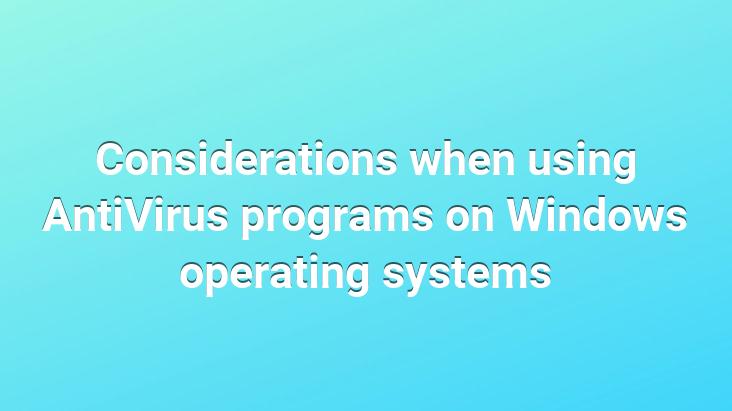
Hello,
There are some exclusions we recommend for using AntiVirus for the problems we are working on in the Windows Platform team.. Especially when the files used by the system are scanned, “locking” them, in other words, allowing only one program to access them, can cause errors related to the functioning of the system.. When we get an “Access denied” or a different “Sharing Violation” error, it is easy to comment and continue, but we are often not so lucky.. For example, for NTDS replication, log 1084 is searched for in the system event “Synchronization of the local domain controller with the source domain controller is blocked until this update problem is corrected.” The statement can be examined.
First of all, we can take the following article as a reference, which was recommended and written by the Windows Product Group. (The operating system names in the Turkish article have not been updated yet.. However, as can be seen in the English version, it covers all operating systems from Windows 2000 to Windows 7.. )
Virus scanning recommendations for computers running Windows Server 2003, Windows 2000, or Windows XP http://support.microsoft.com/kb/822158/en
In this article, especially Windows Update folder, Widnows security files and Group Policy related files, AD-related files for AV programs running on Domain Controllers and deactivation of SYSVOL folder
To summarize by Windows server roles:
http://support The steps specified in the article .microsoft.com/kb/822158/en should be followed. The following is for summary reference only. For details, the steps defined in the appropriate role for the server should be followed in the relevant article.
1- Domain Controller:
– %systemroot%Sysvol
– %systemroot%ntds
2- File replication (NtFrs):
– %systemroot% ntfrs (and folders below)
3- DHCP:
– %systemroot%system32dhcp (and folders below)
4- DNS:
– %systemroot%system32dns (and folders below)
5- Cluster Services:
<
KB250355 – Antivirus Software May Cause Problems with Cluster Services
http://support.microsoft.com/kb/250355– Quorum Drive
– %systemroot% Cluster
For other servers:
6- Exchange:
KB328841 – Exchange and antivirus software
http:/ /support.microsoft.com/kb/328841
KB823166 – Overview of Exchange Server 2003 and antivirus software
http://support.microsoft.com/k b/823166
KB245822 – Recommendations for troubleshooting an Exchange Server computer with antivirus software installed
http://support.microsoft.com/kb/245822Anti-Virus folder exclusions have not been configured
http://technet.microsoft.com/en-us/library/aa997602(EXCHG.80).aspx
7- SQL:
KB309422 – Guidelines for choosing antivirus software to run on the computers that are running SQL Server
http://support.microsoft.com/kb/3094228- IIS:
– %systemroot%system32inetsrv
– %systemroot%IIS Temporary Compressed Files (must be changed for systems not installed by default)
KB817442 – IIS 6.0: Antivirus Scanning of IIS Compression Directory May Result in 0-Byte File
http://support.microsoft.com/kb/817442
KB821749 – Antivirus software may cause IIS to stop unexpectedly
http://support.microsoft.com/kb/8217499- WSUS:
– MSSQL$WSUS
– WSUS
KB900638 – Multiple symptoms occur if an antivirus scan occurs while the Wsusscan.cab file is copied
http://support.microsoft.com/kb/900638
10- Hyper-V:
KB961804 – Error code when you create or start a virtual machine on a Windows Server 2008-based computer that has Hyper-V or on a Microsoft Hyper-V Server 2008-based computer: “0x800704C8”, “0x80070037” or “0x800703E3”
http://support.microsoft.com/kb/961804
blockquote>